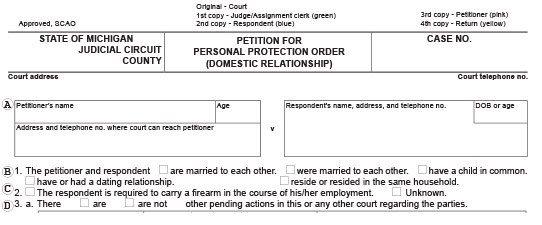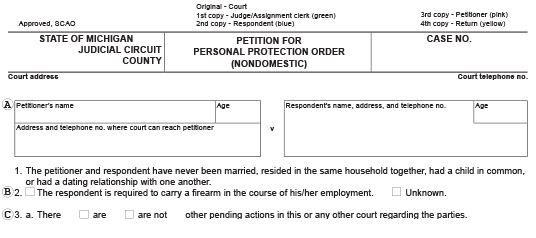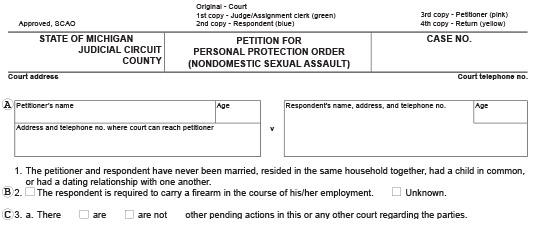In Michigan, a Personal Protection Order (also known as a PPO) is a court order to stop threats or violence against an individual. The primary purpose of a PPO is to protect individuals from someone who is threatening, hurting, stalking and/or harassing them. An individual can receive a PPO from a circuit court judge if they can demonstrate that they are facing a legitimate threat or have reasonable fear for their personal safety.
A PPO can also prevent a person from bothering or harassing an individual at their home or place of business, as well as preventing a person from removing an individual’s children unless required by court order. There are multiple kinds of PPOs available depending on the circumstances.
Our law firm specializes in family law and criminal defense. Using this knowledge, we’ve prepared basic information on Michigan PPOs below.
Types of PPOs
There are three primary types of PPOs in Michigan, which are: Domestic PPO, Non-Domestic Stalking PPO, and Non-domestic Sexual Assault PPO. It is important to understand which type best fits your circumstances before proceeding with filing your petition with the circuit court. This will ensure the process proceeds smoothly in the shortest amount of time possible.
The most common type of PPO is the Domestic PPO. This is used in situations where the abuser is a current or former domestic partner or when the abuser is someone who resides in the same residence as the victim or formerly resided there. In this case, the victim would have to show a judge that the abuser is likely to assault, threaten, harass or stalk them.
In situations where the abuser does not have a domestic relationship with the victim and is stalking or harassing them, the Non-Domestic Stalking PPO is applicable. In order to receive a Non-Domestic PPO, the victim must prove to a judge that there has been a minimum of two previous incidents of harassment. This would be any sort of unwanted contact that would cause a reasonable person to suffer emotional harm or fear, such as repeatedly showing up at the victims home, workplace or unwanted phone calls or texts.
The third and final type are Non-Domestic Sexual Assault PPOs, which serve to protect a victim from a person who has sexually assaulted or threatened to sexually assault them, but does not live with them. This type of PPO would also be applicable to the protection of minors who have been given obscene material of a sexual nature. In order to receive this type of PPO, the victim would have to prove a history of previous sexual assault by the abuser or prove that the abuser has threatened sexual assault.
All types of PPOs prevent a person from doing certain things to the victim, and these protections can be modified or added to depending on a judge’s decision. Below are a list of the most common things an abuser is prevented from doing under a PPO:
- Threatening to cause bodily harm or death to the victim or another individual
- Appearing within sight of the victim
- Appearing at the victims home or place of work
- Approaching or confronting the victim
- Visiting a specific property or place
- Initiating contact with the victim via phone, computer or any other means
- Cyberstalking the victim
- Buying or being in possession of a firearm
- Any act or behavior that impedes the personal freedom of the victim or makes them reasonably afraid for their safety
Personal Protection Order Forms
This section provides examples of each PPO including blank PDF forms available for download. These examples are taken from the website for the Oakland County Circuit Court.
Domestic Personal Protection Order

This is used in situations where the abuser is a current or former domestic partner or when the abuser is someone who resides in the same residence as the victim or formerly resided there.
Domestic PPO PDF
Non-Domestic Stalking Personal Protection Order

This is used when the abuser does not have a domestic relationship with the victim and is stalking or harassing them.
Non-Domestic Stalking PPO PDF
Non-domestic Sexual Assault Personal Protection Order

This serves to protect a victim from a person who has sexually assaulted or threatened to sexually assault them, but does not live with them.
Non-Domestic Sexual Assault PPO PDF
Filing a PPO
In order to receive a PPO in Michigan, the victim must file a petition with the court. This petition will list the specific type of PPO requested, along with information that the judge will use to decide whether or not a PPO is warranted. When filling out the petition, the victim should be as specific as possible regarding the dates in which the abuses occurred as well as the details of each incident. While not required, it is strongly advised to include copies of any police reports or other supporting documents in the petition, as this can only improve the likelihood of the PPO being granted.
For situations where the victim is concerned about the abuser harming them if they were to find out about the victim’s petition for a PPO, there is an emergency PPO known as an ex parte order. This prevents the abuser from knowing that a petition for a PPO has been filed until after the PPO has been granted. The ex parte must be requested at the same time as the filing of the petition for a PPO, and if it is denied the abuser will be notified of the PPO regardless.
Your local County Circuit Court should have further information on filing a PPO. For example, the Oakland County Circuit Court has instructions on filing along with a section of their website dedicated to e-filing these documents. If you have the means to do so, it’s advised to hire an attorney to help you fill out and process these forms.




